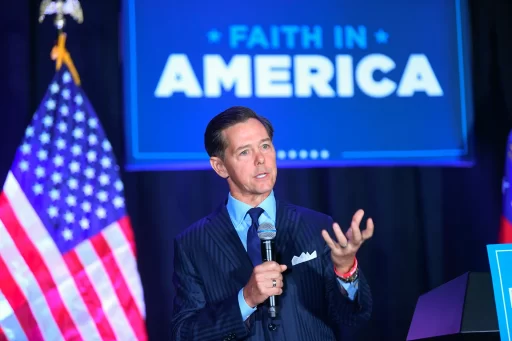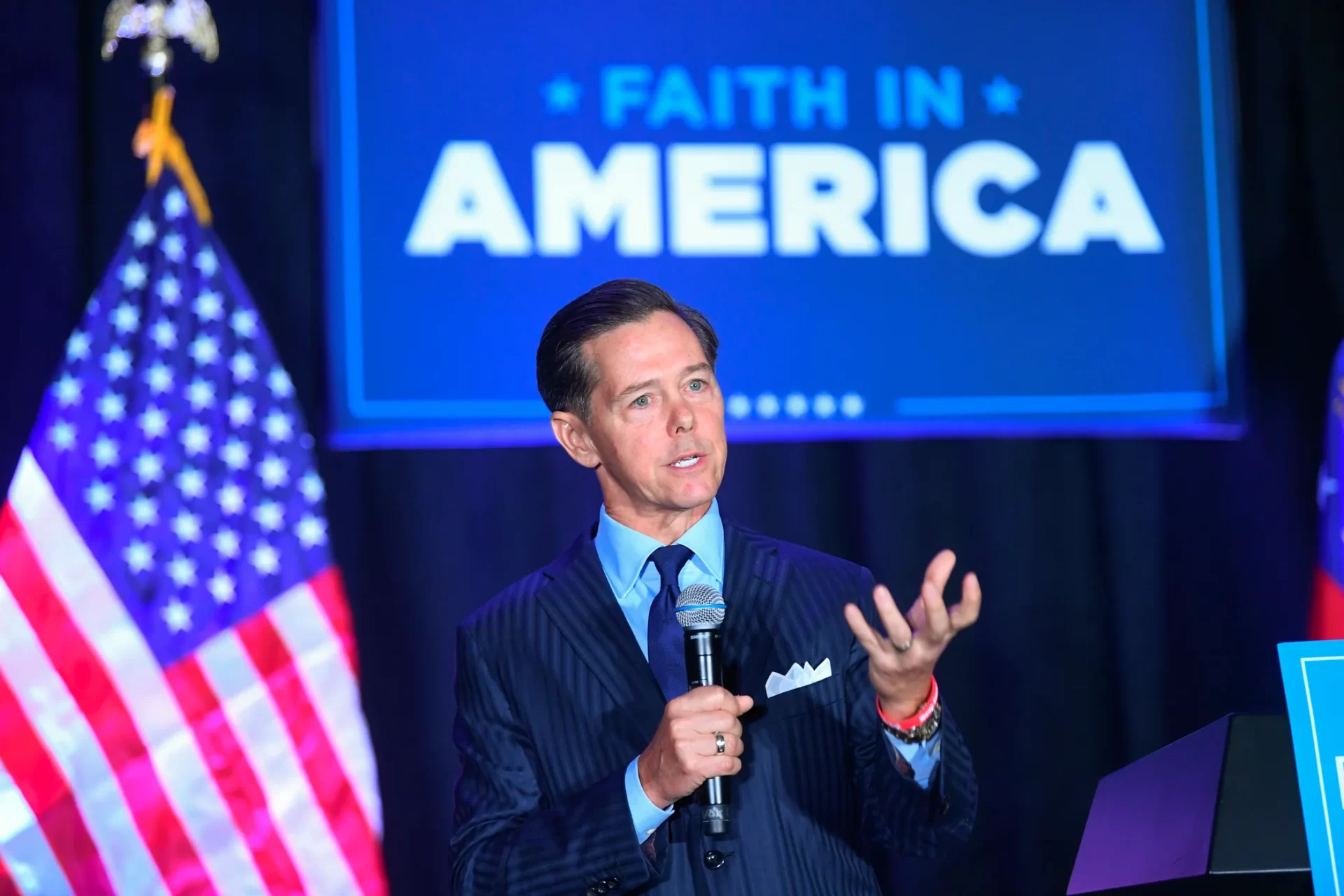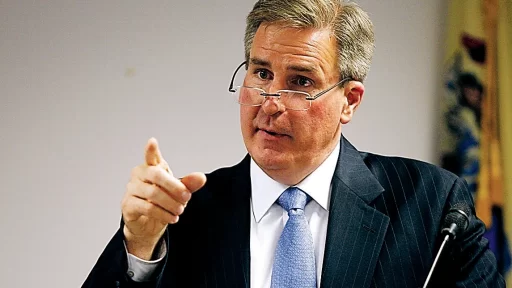Ralph Reed, Executive Director of the Christian Coalition, was the second featured speaker in the Robertson School of Government’s spring Profiles in Excellence series. Before addressing the student body, he granted an interview with the editors of NP. Following is our conversation with the political strategist who’s Contract with the American Family was endorsed by prominent Senators and Congressmen, including Speaker of the House Newt Gingrich.
On Gridlock, Revolution, and Growing Extremes
[NP] The latest conventional wisdom is that American voters want split government with neither side waging unchecked revolution. How does that political mood affect your strategy?
[Reed] There is a zeitgeist on Capitol Hill of bi-partisanship and cooperation which stands in stark contrast to what was going on in early ’95 and even early ’96 as we headed through the Contract with America; and then ultimately toward the budget battles of 1995 and ’96. Having said that, I saw one survey that indicated that 80% of the American people voted for the President and the Congressional candidate of the same party, either Democrat or Republican. I think the majority of the American people don’t want divided government. But 20% to 30% of the electorate split their tickets and that’s how we got what we have for better or for worse.
Given the fact, I think, that the Republicans hoped, and certainly in ’95, expected to defeat Bill Clinton; and I think the Democrats hoped, after the government shut down and the budget battle, that they would be able to use the Medicaid and Medicare issues to defeat Newt Gingrich and Congress. The Republicans having failed, either through the use of issues or scandals, to defeat Clinton, and the Democrats having failed to take out the Republican Congress either through Gingrich’s ethics troubles or the Medicare/Medicaid issues, I think we now have a stalemate and they’ve both reconciled themselves to the fact that they’re stuck with each other. If anything is going to get done, it’s going to have to get done together.
How does that affect our strategy? It certainly means that we can’t rely any longer solely on Republican votes to get things passed. And it’s going to make it harder for us to get certain parts of our agenda through. We saw that today in the House of Representatives when the international family planning vote, we came up ten votes short. Thats a vote that you’d be hard pressed to argue we would have won before the 1996 elections, but it certainly made it harder. Its not going to be easy.
I believe the margin, right now, for Republicans in the House is the closest margin of either party controlling the House since World War II. There is just no margin for error. If you lose just five members of your own party, it’s over.
[NP] Isn’t Congress less moderate? Aren’t both sides leaning more to the extremes?
[Reed] As the so-called moderate to centrist Democrats retire, most of whom are from the South, their seats are being taken by much more aggressive pro-family, populist Republicans. But there are exceptions to that. In the Fort Worth district, formerly held by Pete Geren, a conservative-to-moderate Democrat, is now held by a fairly moderate, pro-choice Republican, Kay Granger, the former mayor of Fort Worth. (We got her vote today, by the way, on international family planning).
Getting Xers to the Polls
[NP] You were once a political youth leader, and according to some age categories, you’re actually a Generation Xer, what is it going to take to get apathetic Xers to the polls?
[Reed] I thought I was a baby boomer (laughter). I’m either the last of the baby boomers, or I’m the first of generation X. I honestly don’t know what the answer to that is, other than the fact that I think as Generation Xers continue to move through the electorate and finish their schooling and get their first jobs and get married and have children, I think that we will find that they, as with the Baby Boomers who came before them, that as they nest and bear children and become involved in the mainstream of economic life, they’re going to be more and more concerned about issues of family, taxes, faith. They’re going to want to have a secure values system for themselves, their families, and their children. I don’t think we’re there yet, but I do think we’re going to get there.
Presidential Politics
[NP] Who do you see as the ideal presidential candidate in the year 2000?
[Reed] I think the top-tier candidates for the Republican nomination will be Jack Kemp, Dan Quayle, George W. Bush, and Trent Lott if everyone of those four runs. I don’t think it’s certain that everyone of them will run. Then beyond that you have Pat Buchanan, Steve Forbes, Alan Keyes, Lamar Alexander, and many others. Maybe John Kasich is looking at it. A lot of people will look at it. I think that John McCain of Arizona is going to look at it. There will be many. Don Nichols of Oklahoma will look at it.
This is going to be the most wide-open contest for the Republican nomination for President since 1940. It will be the first time really since 1940, that there hasn’t been a front runner. Tom Dewey was the front-runner in ’44 and ’48, Eisenhower obviously in ’52. Nixon was unopposed in ’60, and even though he had opposition in ’68, it was not very strong. Reagan, obviously in ’80, Ford in ’76, Bush in ’88 and then Dole in ’96. It doesn’t seem rather extraordinary that it has been that long, more than a half century, but it has been more than 50 years since the Republicans went into a presidential nominating process and had no one as the clear front-runner.
It’s often been noted that Democrats have a propensity towards nominating a dark horse. McGovern in ’72, he came out of nowhere. Jimmy Carter in ’76. Even Bill Clinton. He wasn’t really even on the radar screen as early as two years before he was nominated. People were talking about people like Cuomo and Kerry and Nun.
[NP] Clinton was still boring them at the convention in 88…
[Reed] Yeah. So, the Democrats have had a tendency to nominate dark horses. Republicans have had the opposite tendency. Which is to nominate the person who waited their turn and they were the established front-runner. That was even true of Reagan in 80. He was not nominated in ’76 when he was sort of the upstart; he was nominated in 1980 when he was the clear front-runner. The conventional wisdom has been that it took more than one or two tries to go. I guess by that argument, Kemp and/or Quayle would be the front-runners. But as I said, I think George W. Bush will be very formidable if he runs. He kind of gets a leg up over a lot of other governors because of this namesake.
[NP] In a generic sense, what is the most important leadership characteristic that a winner will have to have?
[Reed] Without looking at specific candidates, I tend to think people are looking for new, fresh faces. In a counter-intuitive way, the Republicans, have nominated now, the last two open cycles, the guy who had waited in line the longest, and it really didn’t work out for them. The best thing would be to nominate a new face, something different. And secondly, to have had some kind of record outside of Washington. I think that helped Reagan, it helped Carter, it helped Clinton. That would tend to help a Forbes, an Alexander, and a Bush.
On Christians in Politics
[NP] How can Christians be in the political world and still follow the New Testament advice to not be of the world?
[Reed] The same way they do it in every other area. In the words of St. Paul, they are aliens in a foreign country. They have dual citizenship. They are citizens of the kingdom of God and they are citizens of whatever temporal kingdom they are a part of at that moment in time. I think the main thing is for Christians who get involved in the political arena, to not make the mistake that Christians on the left did in the 1960s in thinking that you could solve and ameliorate great social problems through political action and through government programs. We, for example, as pro-life, conservative Christians, may think that if we just pass a law banning abortion that we will solve the problem. The fact is, that even before Roe v. Wade, about 1 of every 5 pregnancies in America ended in abortion. You don’t end abortion by passing a law against it. You don’t end racial discrimination by passing a law against it. You don’t end poverty by declaring war on it. These are matters of the heart and matters of the soul.
That is not to say that political action and government activism doesn’t have a role. But it has to be a limited role. I think the biggest mistakes for Christians in the political arena is in thinking that political action, rather than the Church, can usher in a spiritual renewal. The government can’t do that. No matter who’s in charge of it. It’s not an issue of the good intentions of those in power. It’s an issue of the institution. The institution of government is not ordained, nor is it well suited for the task of social regeneration or reformation.
[NP] How can principled conservatives out-think and out-perform opponents who compete by any means necessary?
[Reed] I don’t think it’s all that hard. This is not rocket science. You go out and you identify the issues that the voters care about and you talk about those issues. If your opponent attacks you, you respond immediately. You stay on the offense and not on the defense. You don’t apologize for who your friends are. And you don’t apologize for who your enemies are. You speak in a way that makes it easier for people who might not have considered themselves part of your coalition before to feel welcome in your ranks.
What Clinton did in 1996 was identify a series of values issues that he could move on other than abortion, school prayer, and gay rights, and then co-opt a lot of the values agenda that properly belonged with conservatives and Republicans. They deserve more blame than he deserves credit. At no point did they call his hand and run themselves on the values issues. It’s kind of ironic that the values issues historically have belonged to the Republican Party and to conservatives. But in 1996, it was Clinton who was running on school uniforms, teen curfews, stopping tobacco companies from marketing to young people, welfare reform… and what was the centerpiece of the Republican campaign? A tax cut. What the American people were hungering for was someone to speak to their values. And ironically enough, it was a Democrat, and not a Republican, who was doing that.
[NP] Dick Morris confessed that they would have been beat if the Republicans had challenged him.
[Reed] They kept waiting for the Republicans to trump them on values and they didn’t do it.
On the Samaritan Project
“We’re not trying to re-create a conservative analogue to the war on poverty by having the government do everything … We don’t want to get into a fight with the traditional civil rights leadership there’s a place for them, they have a role to play, and we respect that role. But we think that there is a new wave coming; people who aren’t looking for government grants or handouts.”
[NP] Kay James has said that principled conservatives, despite popular criticism, are the most truly compassionate group; how is that belief reflected in the Christian Coalition’s Samaritan Project?
[Reed] I think the American people reject both extremes in the debate over poverty. They reject the one extreme on the left that the answer to every social ill is a government program. I think they reject the other extreme in that continuum which is that government has no role and we shouldn’t be doing anything. I don’t think the American people believe that government is the answer. I also don’t think the American people believe that government shouldn’t be doing anything. What they want, is a mixture of some limited government action, some business and private sector action, some charity and faith/community/church and synagogue action.
The Samaritan project reflects that. We’re not trying to re-create a conservative analogue to the war on poverty by having the government do everything. Even the things that are in the program such as the empowerment zones which are designed to create jobs; it’s not the government creating jobs, it’s the government creating an environment of lower taxes to help create jobs. In the area of school choice, we do have government scholarships. But they are designed to spur a greater flowering of private and parochial schools in the inner city. So it’s a partnership between the private or parochial school and the government, providing aid to the student. In the case of the $500 charitable tax credit, it’s a tax credit to someone who volunteers at a charity and gives money to a charity. What we’ve tried to do is embody that middle ground between no government action at all, and too much government action. We think there are many cases where government may be the problem.
We want to eliminate the barriers to faith-based churches and ministries getting involved and helping. Our goal is to raise $1 million this year, and $10 million by the year 2000 to help ministries that are on the front lines. My view is that beyond the leadership of a largely white Republican party, and the traditional liberal Democratic civil rights leadership, there is a huge flowering of ministries, churches, para-churches, and organizations at the grass roots, that are doing great work. They just need somebody to acknowledge that work and provide a platform for that work. And that’s what we want to do.
We don’t want to get into a fight with the traditional civil rights leadership, there’s a place for them, they have a role to play, and we respect that role. But we think that there is a new wave coming; people who aren’t looking for government grants or handouts. They’re just trying to train women to move from welfare to work; they’re trying to train people who don’t know how to read, how to read; they’re trying to train the unemployed on how to get jobs; they’re trying to help small businesses find ways to hire people off welfare; they’re trying to make sure that young adolescent males have positive male role models; they’re trying to ensure that there’s an escape hatch for people who are trapped in schools that are unsafe and infested with drugs and crime.
Most of those people are unsung heroes. We don’t know their names or faces. People may know who the Christian Coalition is, they may know who the NAACP and the Rainbow Coalition are, but they don’t know who these largely anonymous, grassroots activists are. And we hope that through the Samaritan Project, we’re going to be able to give them a platform and point the spotlight at them.
On Culture: America’s Heart and Soul
[NP] Who’s winning the culture war?
[Reed] I think we are. The President has moved in our direction. He signed our welfare reform bill; signed the defense of marriage act, acknowledging and affirming that a marriage, as defined throughout western civilization, is a man and a woman, living in holy matrimony. We’re going to see a dramatic tax cut for families with children passed by this Congress. With or without a Constitutional Amendment, we’re moving towards a balanced budget. Abortion rates are declining. Illegitimacy rates are leveling off. School choice is clearly the civil rights issue of the ’90s and the American people are with us on that. There’s been a tremendous interest in things spiritual that d can see reflected in everything from the success of television programs like “Touched by an Angel,” to the success of movies like “The Preachers Wife” about attempts by an inner city church to revitalize a neighborhood infested with gangs and crime. People are interested in matters of the heart and matters of the soul, and I think things are moving in our direction.
The Christian Coalition is a grass-roots citizen organization with 1.6 million members and supporters. For more information about the Christian Coalition or the Samaritan project, visit https://www.cc.org.





